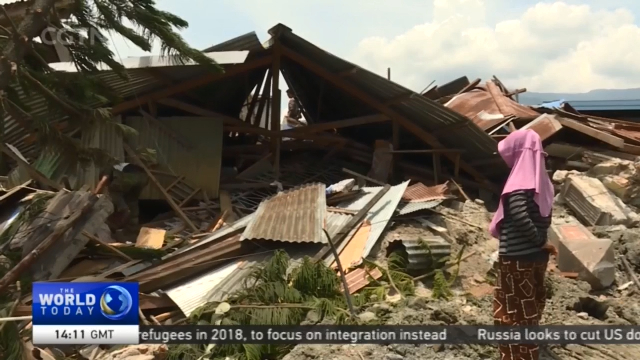
23:22, 04-Oct-2018
Indonesia Disaster: Hundreds believed to be buried beneath rubble in Palu
Updated
22:21, 07-Oct-2018
02:32

To Indonesia now, and the disaster-battered island of Sulawesi, where the official death toll from last week's earthquake and tsunami has risen again. The government now says 1,424 people are confirmed dead. As CGTN's Barnaby Lo learned on a visit to one of the island's most devastated neighborhoods, it's a number that will almost certainly continue to rise.
The stench is overpowering; underneath all the rubble in this community – death. Hundreds of families lived in Balaroa, a government housing complex in Palu, the Indonesian city hit hardest by last week's earthquake and tsunami. Military officers on the ground tell us as many as 1,000 may have been buried here, with only a fraction having been recovered.
ARMAN SURVIVOR "My father-in-law was about to enter the mosque when the earth shook. He held on to the fence, and then he went up and down as the ground rose and fell."
Arman's father-in-law survived somehow; his entire family is safe, but he's lost almost everything he worked hard for. That's more than most other residents of Balaroa can say, however.
BARNABY LO PALU, INDONESIA "So survivors from this village tell us that what happened here was that the ground shifted. In fact, there was a mosque, and now the mosque is over there. They said that this road rose 4 to 5 meters. It's been cleared now, so now they can go in and find their missing relatives."
These men are clearing debris from what used to be their parents' house, using only their bare hands. They know for a fact that their father and mother didn't make it out of the house during the earthquake.
BOWO SURVIVOR "We have to be here so that when their bodies are found we can bury them."
With more heavy equipment and search and rescue workers on site now, the hope is that bodies can be retrieved faster. But like Bowo and his siblings, most of Balaroa's surviving residents say they've accepted the harsh reality that their missing loved ones may be gone. Barnaby Lo, CGTN, Palu, Indonesia.

SITEMAP
Copyright © 2018 CGTN. Beijing ICP prepared NO.16065310-3
Copyright © 2018 CGTN. Beijing ICP prepared NO.16065310-3